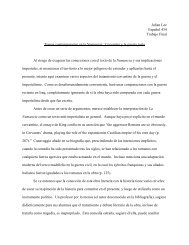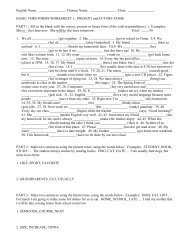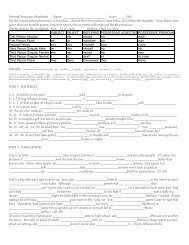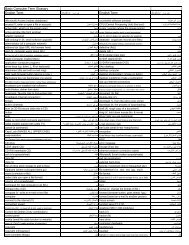Presidential Candidate Viability & Partisan Online ... - Omnifoo.info
Presidential Candidate Viability & Partisan Online ... - Omnifoo.info
Presidential Candidate Viability & Partisan Online ... - Omnifoo.info
You also want an ePaper? Increase the reach of your titles
YUMPU automatically turns print PDFs into web optimized ePapers that Google loves.
cutting the number of sites to be surveyed in half and to the related assumption that the portion of Republican<br />
primary voters who get their <strong>info</strong>rmation on primary candidates from avowedly liberal sources is negligible. 17<br />
Furthermore, Iyengar finds such “selective exposure” to media to increase with partisanship, while a 2008<br />
study by Natalie Stroud suggests that this is especially true for political topics and “persists across media types”<br />
among radio, TV, and online sources. All of these factors point to conservative online media as ripe for<br />
scrutiny in the formation of political opinions about Republican presidential primary candidates.<br />
Who is treated by this study as a candidate is worth discussion in this section. A candidate must have<br />
been campaigning actively for the Republican Party presidential nomination at the time of the website survey<br />
to be included in the list of candidates. In approximate ascending order of national polling in December 2011,<br />
these were Gary Johnson, Jon Huntsman, Rick Santorum, Michele Bachmann, Rick Perry, Ron Paul, Mitt<br />
Romney, and Newt Gingrich. Herman Cain is included in the survey as a candidate even though his campaign<br />
was suspended on December third; similarly, Johnson dropped out to seek the Libertarian Party’s nomination<br />
on December 28 th . Their names are duly stricken from the figure in APPENDIX C showing results of the first<br />
four primaries. To the surprise of the primary researcher, several candidates polling even lower than Johnson<br />
were also actively campaigning, but by the time this was realized, too many sites had already been queried to<br />
add more names (especially as searching for Gary Johnson frequently yielded not a single hit on sites where<br />
leading and even other marginal candidates’ hits were in the dozens, hundreds, or thousands).<br />
For heuristic purposes, 2012 Republican primary candidates will be referred to as being in one of three<br />
tiers: the top tier including only a few who led in November and December polls, a second tier of candidates<br />
who never led but whose campaigns most voters had heard of (likely by virtue of having led in earlier months),<br />
and a third tier of those candidates who had yet to receive much support from eligible voters by November<br />
17 Interestingly, many conservative primary voters likely discovered from liberal media sources how happy many liberals would be if<br />
either Newt Gingrich or, later, Rick Santorum had been the Republican Party’s nominee, on the presumption that both were too<br />
extreme to be accepted by the general electorate. That this influenced some conservatives to favor the more moderate candidate,<br />
Mitt Romney, has been largely assumed by commentators. Other than unusual examples like this, however, few conservatives are<br />
assumed to read liberal media as their main source of <strong>info</strong>rmation on the Republican primaries. The number of liberals, most of whom<br />
do get their <strong>info</strong>rmation from more liberal sources, voting in Republican primaries is also assumed to be very small.<br />
8






